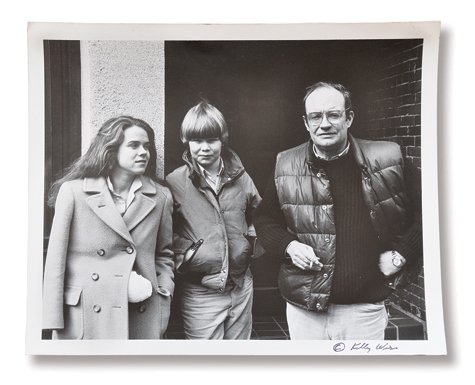COMMUNITY

Just Masterful
Novelist Ward Just At His Prime
By Karla Araujo
There’s a certain irony to novelist Ward Just’s life. He spends much of his time sitting quietly at a 1950 Smith Corona manual typewriter in a detached book-lined studio just steps from his circa 1844 Greek Revival home on a picturesque, historical street in Vineyard Haven. Yet rather than writing about the quirkiness of his neighbors and their manicured lawns with requisite picket fences that have surrounded him on Martha’s Vineyard for the past thirty-odd years, Ward instead mines the fate of men and women who grapple with the mutability of power and the humanity behind it, often on an international scale.
Now, at 78 and as prolific as ever, with his eighteenth novel, American Romantic, due to be published by Houghton Mifflin Harcourt in April 2014, Ward has been characterized by leading literary critics as “an astute observer of politics and politicians,” “an assured chronicler of the American character,” “a quintessential American writer,” “a spellbinding storyteller whose muscular prose is rooted in the best of Hemingway and Thomas Wolfe,” and “often compared to Fitzgerald, O’Hara, Wharton, and Hemingway.”
“You have to love to write fiction,” he says, when asked about his long and acclaimed shelf life as a novelist. “Everything else is peripheral. Or a distraction. You need a tremendous belief in what you’re doing. You have to fall in love with the subject matter. The rest is clutter.”
And, while the book industry has undergone a veritable revolution in the past two decades, Ward has managed to retain both his publisher and his appreciative following, relying on critical praise and word-of-mouth to remain relevant. “I’m not underappreciated,” he observes, his tone dry. “Just undersold.”
While other contemporary novelists embark on national book tours and spend countless hours tweeting, posting on Facebook, and vying for teaching posts at university MFA programs, Ward sits calmly at his desk, day after day, forcibly depressing the keys on his one of his prized typewriters which, at 56 years of age, doesn’t quite qualify as an antique, but comes awfully close. He eschews both computer and cell phone, relying instead on the tools of the trade that have served him well since the beginning of his writing career In 1957 – a personal library that once held up to four thousand books, a landline, the Smith Corona, his astute eye for detail, and a fertile imagination.
“My publisher, Houghton Mifflin, God bless them, hasn’t leaned on me about this,” Ward says. “They’re good about my typewritten manuscripts. Promotion isn’t my favorite activity.” He does, when urged, travel to bookstore events in New York and nearby towns in New England, but believes that a well-received reading right here on the Island can do far more to generate sales. “If I do a hell of a good reading in the summer, sixty people show up. It’s a cosmopolitan crowd and a community of readers can have resonance.”
The Island, Ward says, has provided a warm and vital community in which to live and work. He and his wife, Sarah Catchpole, first rented in West Tisbury for three summers before purchasing a home there in 1982. Thirty years later, they decided to move into Vineyard Haven, finding life in a rural setting, as Ward says, “too lonely during the off-season, with so few lights on.” He and Sarah both love the vintage home they bought in 2012 within walking distance to the boat, the shops, restaurants and the post office. “It seemed like the right time,” Ward says. “And we like being in a real neighborhood.”
Though he has been named a finalist for the Pulitzer Prize for Fiction, the National Book Award, Ward is a two-time winner of the O. Henry Award for both fiction and non-fiction, as well as being selected as a member of the prestigious American Academy of Arts and Letters this year. Ward is unpretentious and relaxed as he chats about more than five decades of writing and life. With his droll sense of humor and keen memory guiding the conversation, he enjoys a tall glass of iced tea and puff after puff on his ever-present Camel non-filter cigarettes.
Born in 1935 and raised in a newspaper publishing family in Waukegan and Lake Forest, Illinois, he attended Trinity College in Hartford for a time, but dropped out to join his father’s Waukegan News-Sun as a reporter in 1957. Within a few years, Ward was writing about war and conflict for Newsweek magazine until he was hired by Ben Bradlee at The Washington Post and sent to Saigon as the newspaper’s Vietnam war correspondent, where he earned accolades for his work. After covering the presidential campaigns of both Eugene McCarthy and Richard Nixon for the Post in 1968, he decided to devote full-time to writing fiction and published his first novel in 1970. Sixteen others followed, many of which depicted the day-to-day lives and ethical struggles of politicians, military officers, diplomats, government officials, intelligence agents, journalists, and lawyers.
Most of his novels are set primarily in the past, some progressing toward near-present day. “I find so much of the past contained in the present,” Ward says. “I try to identify where whatever malaise today has its roots. A decade like the sixties casts a light forward to the present day. The modern world is not as interesting to me.”
Indeed, it’s easy to detect a note of world-weariness in his recitation of today’s technology. “I have no feel for contemporary things: the Internet, computers, apps, streaming, . . .” His voice trails off, as if even recounting twenty-first-century jargon makes him uncomfortable. “I pull on the past like a suit of old clothes,” he acknowledges.
Ward cultivated his sense of discipline through the daily deadlines of the newspaper business. He says that he spends about eight to nine hours most days in his studio, a refurbished small barn-like structure, in the backyard. Although he may only spent four hours typing on what he calls “a good day,” he enjoys beginning each morning with a half-dozen variations of Patience, the card game, a Suduko, reading one of the two or three books he has going at any given time, and listening to classical music.
He thinks his work has improved over the years, observing that he doesn’t use as much paper as he used to. “I’m less promiscuous,” he says. “More concentrated in the effects I’m searching for. I often stop now and contemplate what’s done. I used to do that later, after a whole draft. Now I do more editing and cutting as I go along.” His books are derived almost wholly from his imagination and his memory of the many cities he’s visited over the years. And, while he sees the value of the Internet for research, he says that his novels require very little. “I have the Columbia Encyclopedia – the good one,” he says, adding, with a twinkle in his eye, “from 1957.” Is he joking? It’s hard to tell.
Unlike other novelists who develop outlines to guide their writing, Ward says he rarely envisions more than a couple of chapters of a novel in progress. “I start with a character. Sometimes only a place. I have no idea of a middle and only the dimmest idea of a beginning. Is it about pride, honor, money, women?” He says that he strives to create a rhythmic first sentence, one that often contains, as he puts it, “a lot of information and mystery.”
Citing Fitzgerald, Hemingway, Conrad and Henry James as his favorite authors, Ward says that he often goes back and rereads classics or older books that he has not read before. “I love sea tales,” he admits. “I don’t know how to navigate but I love them.” And while he says he doesn’t enjoy many modern novels, he has high praise for Colum McCann’s recently published TransAtlantic.
In early spring each year, Ward and Sarah make their way to the apartment they rent in Paris, France. They lived in the city for six years beginning in the mid-eighties and it continues to provide creative inspiration for Ward’s work. To ensure his productivity he leaves two typewriters there and brings a deck of cards with him so that he’s sure he can start each morning with his ritual game of Patience.
Could retirement be beckoning? Does Ward ever fantasize about relaxing at the beach with someone else’s good novel and not worrying about his own? With fellow literary luminaries Philip Roth (80 years old) and Alice Munro (82) recently announcing their respective retirements, he says he followed the news with great interest. “But I’m not ready to do that,” he insists. “In part because I don’t know what I’d do with my life.”
While he will divulge only the hint of a plotline for the upcoming American Romantic – the main character is a diplomat and it’s set in the U.S. and abroad – he says that he’ll begin on his next novel as soon as he finishes reviewing the page proofs that are sitting in his study. “Something’s already cooking,” he divulges.
Now, at 78 and as prolific as ever, with his eighteenth novel, American Romantic, due to be published by Houghton Mifflin Harcourt in April 2014, Ward has been characterized by leading literary critics as “an astute observer of politics and politicians,” “an assured chronicler of the American character,” “a quintessential American writer,” “a spellbinding storyteller whose muscular prose is rooted in the best of Hemingway and Thomas Wolfe,” and “often compared to Fitzgerald, O’Hara, Wharton, and Hemingway.”
“You have to love to write fiction,” he says, when asked about his long and acclaimed shelf life as a novelist. “Everything else is peripheral. Or a distraction. You need a tremendous belief in what you’re doing. You have to fall in love with the subject matter. The rest is clutter.”
And, while the book industry has undergone a veritable revolution in the past two decades, Ward has managed to retain both his publisher and his appreciative following, relying on critical praise and word-of-mouth to remain relevant. “I’m not underappreciated,” he observes, his tone dry. “Just undersold.”
While other contemporary novelists embark on national book tours and spend countless hours tweeting, posting on Facebook, and vying for teaching posts at university MFA programs, Ward sits calmly at his desk, day after day, forcibly depressing the keys on his one of his prized typewriters which, at 56 years of age, doesn’t quite qualify as an antique, but comes awfully close. He eschews both computer and cell phone, relying instead on the tools of the trade that have served him well since the beginning of his writing career In 1957 – a personal library that once held up to four thousand books, a landline, the Smith Corona, his astute eye for detail, and a fertile imagination.
“My publisher, Houghton Mifflin, God bless them, hasn’t leaned on me about this,” Ward says. “They’re good about my typewritten manuscripts. Promotion isn’t my favorite activity.” He does, when urged, travel to bookstore events in New York and nearby towns in New England, but believes that a well-received reading right here on the Island can do far more to generate sales. “If I do a hell of a good reading in the summer, sixty people show up. It’s a cosmopolitan crowd and a community of readers can have resonance.”
The Island, Ward says, has provided a warm and vital community in which to live and work. He and his wife, Sarah Catchpole, first rented in West Tisbury for three summers before purchasing a home there in 1982. Thirty years later, they decided to move into Vineyard Haven, finding life in a rural setting, as Ward says, “too lonely during the off-season, with so few lights on.” He and Sarah both love the vintage home they bought in 2012 within walking distance to the boat, the shops, restaurants and the post office. “It seemed like the right time,” Ward says. “And we like being in a real neighborhood.”
Though he has been named a finalist for the Pulitzer Prize for Fiction, the National Book Award, Ward is a two-time winner of the O. Henry Award for both fiction and non-fiction, as well as being selected as a member of the prestigious American Academy of Arts and Letters this year. Ward is unpretentious and relaxed as he chats about more than five decades of writing and life. With his droll sense of humor and keen memory guiding the conversation, he enjoys a tall glass of iced tea and puff after puff on his ever-present Camel non-filter cigarettes.
Born in 1935 and raised in a newspaper publishing family in Waukegan and Lake Forest, Illinois, he attended Trinity College in Hartford for a time, but dropped out to join his father’s Waukegan News-Sun as a reporter in 1957. Within a few years, Ward was writing about war and conflict for Newsweek magazine until he was hired by Ben Bradlee at The Washington Post and sent to Saigon as the newspaper’s Vietnam war correspondent, where he earned accolades for his work. After covering the presidential campaigns of both Eugene McCarthy and Richard Nixon for the Post in 1968, he decided to devote full-time to writing fiction and published his first novel in 1970. Sixteen others followed, many of which depicted the day-to-day lives and ethical struggles of politicians, military officers, diplomats, government officials, intelligence agents, journalists, and lawyers.
Most of his novels are set primarily in the past, some progressing toward near-present day. “I find so much of the past contained in the present,” Ward says. “I try to identify where whatever malaise today has its roots. A decade like the sixties casts a light forward to the present day. The modern world is not as interesting to me.”
Indeed, it’s easy to detect a note of world-weariness in his recitation of today’s technology. “I have no feel for contemporary things: the Internet, computers, apps, streaming, . . .” His voice trails off, as if even recounting twenty-first-century jargon makes him uncomfortable. “I pull on the past like a suit of old clothes,” he acknowledges.
Ward cultivated his sense of discipline through the daily deadlines of the newspaper business. He says that he spends about eight to nine hours most days in his studio, a refurbished small barn-like structure, in the backyard. Although he may only spent four hours typing on what he calls “a good day,” he enjoys beginning each morning with a half-dozen variations of Patience, the card game, a Suduko, reading one of the two or three books he has going at any given time, and listening to classical music.
He thinks his work has improved over the years, observing that he doesn’t use as much paper as he used to. “I’m less promiscuous,” he says. “More concentrated in the effects I’m searching for. I often stop now and contemplate what’s done. I used to do that later, after a whole draft. Now I do more editing and cutting as I go along.” His books are derived almost wholly from his imagination and his memory of the many cities he’s visited over the years. And, while he sees the value of the Internet for research, he says that his novels require very little. “I have the Columbia Encyclopedia – the good one,” he says, adding, with a twinkle in his eye, “from 1957.” Is he joking? It’s hard to tell.
Unlike other novelists who develop outlines to guide their writing, Ward says he rarely envisions more than a couple of chapters of a novel in progress. “I start with a character. Sometimes only a place. I have no idea of a middle and only the dimmest idea of a beginning. Is it about pride, honor, money, women?” He says that he strives to create a rhythmic first sentence, one that often contains, as he puts it, “a lot of information and mystery.”
Citing Fitzgerald, Hemingway, Conrad and Henry James as his favorite authors, Ward says that he often goes back and rereads classics or older books that he has not read before. “I love sea tales,” he admits. “I don’t know how to navigate but I love them.” And while he says he doesn’t enjoy many modern novels, he has high praise for Colum McCann’s recently published TransAtlantic.
In early spring each year, Ward and Sarah make their way to the apartment they rent in Paris, France. They lived in the city for six years beginning in the mid-eighties and it continues to provide creative inspiration for Ward’s work. To ensure his productivity he leaves two typewriters there and brings a deck of cards with him so that he’s sure he can start each morning with his ritual game of Patience.
Could retirement be beckoning? Does Ward ever fantasize about relaxing at the beach with someone else’s good novel and not worrying about his own? With fellow literary luminaries Philip Roth (80 years old) and Alice Munro (82) recently announcing their respective retirements, he says he followed the news with great interest. “But I’m not ready to do that,” he insists. “In part because I don’t know what I’d do with my life.”
While he will divulge only the hint of a plotline for the upcoming American Romantic – the main character is a diplomat and it’s set in the U.S. and abroad – he says that he’ll begin on his next novel as soon as he finishes reviewing the page proofs that are sitting in his study. “Something’s already cooking,” he divulges.








